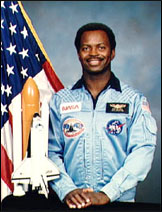About Ronald McNair

Ronald Erwin McNair was born October 21, 1950, in Lake City, South Carolina. McNair was inspired to work hard and persevere in his studies by his family and a teacher who recognized his scientific potential and believed in him. He graduated as valedictorian from Carver High School in 1967. In 1971, McNair graduated magna cum laude and received a bachelor’s degree in physics from North Carolina A&T State University (Greensboro). He then enrolled in the prestigious Massachusetts Institute of Technology (MIT), where he earned his Ph.D. in laser physics in 1976. In 1978, he joined the NASA space shuttle program as a mission specialist and orbited the earth aboard the Space Shuttle Challenger in February 1984.
At age 26, McNair received his Ph.D. and was the second African-American to fly in space. McNair also received numerous distinguished honors and awards, including:
- Presidential Scholar, 1967 – 71;
- National Ford Foundation Fellow, 1971 – 74;
- National Fellowship Fund Fellow, 1974 – 75;
- A NATO Fellow, 1975;
- Omega Psi Phis Scholar of the Year, 1975;
- AAU Karate Gold Medal, 1976;
- National Society of Black Professional Engineers, 1979;
- Distinguished National Scientist, 1970;
- Who’s Who Among Black Americans, 1980;
- Posthumously awarded the Congressional Space Medal of Honor
McNair was also presented three honorary doctorate degrees:
- Honorary Doctorate of Law from North Carolina A&T State University in 1978;
- Honorary Doctorate of Science from Morris College in 1980; and
- Honorary Doctorate of Science from the University of South Carolina in 1984
McNair, a physicist and astronaut, dared to dream. As an African-American growing up in a poor community in the South – a child of poverty and segregation – he encountered discrimination early in his youth. McNair learned that challenges and risks were a part of life. He dedicated himself to creating a world in which all people could one day realize their dreams, as he did when he became a scientist. In 1984, McNair told University of South Carolina students, “True courage comes in enduring ... persevering and believing in one’s self.”
McNair was also a family man. He was married to Cheryl; the couple later had a son, Reginald, and a daughter, Joy. He had a great appreciation for music, which led him to become an accomplished jazz saxophonist. He also earned a fifth-degree black belt in karate and taught classes at the community center.
After his death in the Challenger space shuttle accident on January 28, 1986, South Carolina delegates proclaimed to Congress, “Ronald McNair represents an outstanding role model of achievement, especially for young African-Americans.” Congress provided funding for the Ronald E. McNair Post-baccalaureate Achievement Program with a goal to encourage low-income and first-generation college students to expand their educational opportunities by enrolling in Ph.D. programs and ultimately pursue careers in academia. This Program is dedicated to the love of learning and the high standard of achievement inspired by the life of Dr. Ronald E. McNair.

